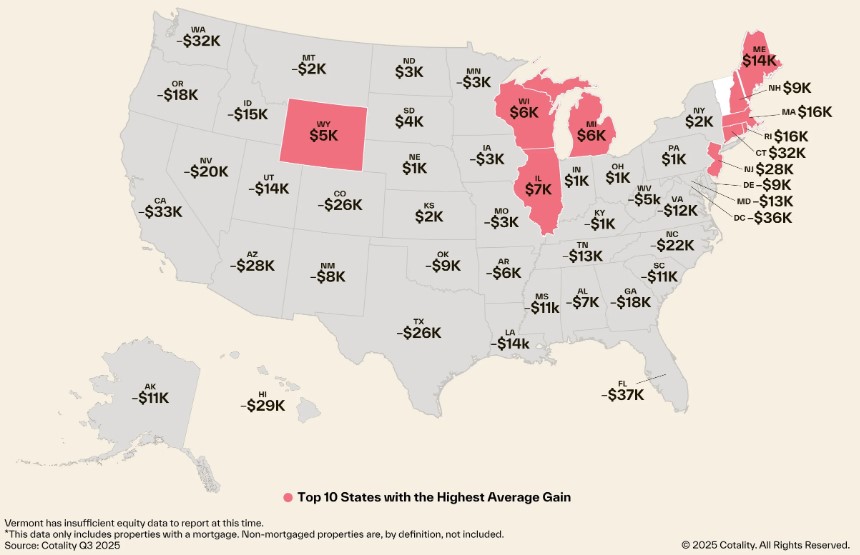Home equity growth slows in 2025
Equity is one of homeownership’s major financial advantages over renting.
Home equity is how many people build wealth and, when tapped into, can provide borrowers with money for renovating and remodeling, investing, an emergency fund or even paying off other debt.
Homeowners with mortgages saw a collective equity of $17.1 trillion in 2025’s third quarter, according to Cotality. That actually decreased by $13,400 annually, leaving the average borrower with $299,000 in equity. See which states enjoyed the largest and smallest bumps to their home equity in Q3 2025.
Cash out your home equity. Start hereThe latest home equity gains
Home equity grows or shrinks in conjunction with housing prices.
In 2025’s third quarter, U.S. borrowers combined to lose $373.8 billion — a decrease of 2.1% — annually in home equity. The average mortgaged homeowner lost about $13,400 in equity year-over-year but still sits on about $299,000. Comparatively, homeowners gained $25,000 in equity over 2023 and $4,900 over 2024.
“As the pace of home price growth slows and markets recalibrate from pandemic peaks, we’re seeing a clear shift in equity trends,” said Selma Hepp, chief economist at Cotality. “Negative equity is on the rise, driven in part by affordability challenges that have led many first-time and lower-income buyers to over-leverage through piggyback loans or minimal down payments. While overall home equity remains elevated, recent purchasers with smaller down payments may now face negative equity.”
Home equity changes by state
The third quarter’s home equity gains varied around the country. Borrowers in some states saw towering growth over the national average, while others had modest increases and even declines.
The Northeast led the way in equity gains, with annual increases of about $31,500 in Connecticut, $27,500 in New Jersey, and $16,200 in Rhode Island.
At the other end of the spectrum, borrowers in Florida saw the largest equity decrease with a $37,400 drop year-over-year. That was followed by losses of around $35,500 in Washington, D.C., and $32,500 in California.
The map below shows the third quarter’s estimated annualized home equity changes by state, per Cotality:

How can you use home equity?
Since home equity is tied up in your property, it must be converted to liquid cash in order to be used. There are three main ways to do this: a home equity loan (HEL), a home equity line of credit (HELOC), or a cash-out refinance.
With a home equity loan, you keep your existing mortgage and take out a second loan against your property. These typically have lower closing costs but may come with slightly higher interest rates compared to cash-out refis. Here is a list of everything you need for taking out a home equity loan this year.
HELOCs work similarly to credit cards, with borrowing limits that can be repaid and reused. They usually come with variable rates and low or no closing costs, and you pay interest only on the outstanding loan balance. HELOCs also have set “draw periods” after which you have to repay the remaining balance in full. Here is a full list of HELOC requirements.
With a cash-out refi, you replace your existing home loan with a new primary mortgage. The new loan’s balance will be larger than what you owed, but that difference gets returned to you as cash. Refinance closing costs average around 2-5% of the loan amount and usually get taken out of your cash back total. See if you qualify for a cash-out refi.
Once you’ve cashed out your equity, it can be used for just about anything you want. Many homeowners tap equity to complete home improvements or repairs, consolidate high-interest debt into one cheaper loan payment, or make a down payment on a vacation home or rental property.
Cash out your home equity. Start hereHow do I calculate my home equity?
Home equity is the amount of cash value built up in your property. As you pay down your mortgage and housing values increase, your equity grows.
To figure out your total equity, take your home’s current value and subtract your mortgage balance. If your house is worth $500,000 with a loan balance of $300,000, then you have $200,000 in equity.
Getting an estimated property value requires using an online evaluator, researching recent comparable home sales in your area, or paying for an appraisal. Your lender can assist you in this process and figure out the best way to take advantage of your equity.
How much equity can I take out of my property?
Typically, borrowers can’t cash out all the equity they built up. With exception, lenders normally prefer to keep 20% of your home’s value untouched as default protection. The remaining amount is referred to as “tappable” equity.
Based on the example in the section above, your 20% buffer comes out to $100,000 ($500,000 x 0.2). After subtracting that from your total equity, you end up with $100,000 in tappable equity ($200,000 - $100,000).
Your next steps
If you have a running list of uses for your home’s equity, you can start tapping into it.
The best way to figure out how much you can borrow and which loan type to use is to talk with your lender. They can guide you through property valuations, the best ways to tap your equity and which you qualify for.
Leveraging your equity is one of the biggest benefits of owning a home and a way to make your money work for you.
Time to make a move? Let us find the right mortgage for you
